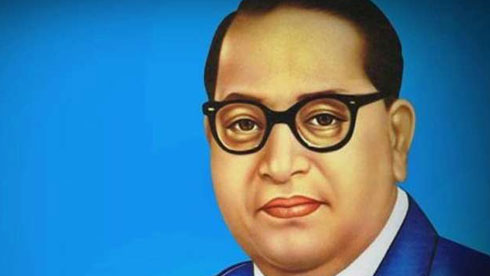Babasaheb Ambedkar is considered as the principle architect of the constitution of India. He was an eminent jurist as well as a revered politician. There are certain very vital aspects that are associated with Dr. Ambedkar’s life and the impact it rendered to the social structure of our country. He led a very significant movement to eliminate the social evil of untouchability that plagued the country very badly. His movement to reduce the negative impacts of caste restrictions is also worth mentioning. Primarily he was regarded as a leader of the backward classes because he led a relentless fight for the rights of the backward section of our society who were dominated and exploited by the upper castes. He was also the first law minister of independent India. Dr. B. R. Ambedkar was born in 14th April, 1891 and passed away on 6th December, 1956. In 1990, Ambedkar was awarded the Bharatratna, posthumously.
The Life of Dr. Ambedkar
Babasaheb Bhim Rao Ambedkar was born in Madhya Pradesh to Ramji and Bhimabai Sakpaal as their fourteenth child. At that time Bhimabai Ambedkar was serving as a Subedar in the Indian army in the Mhow cantonment, located in Madhya Pradesh. Following Bhimabai’s retirement in 1894, the family shifted base to Satara, and Sakpal, Ambedkar’s mother happened to pass away shortly after this. Bhimabai remarried after four years and the family again shifted base to Mumbai, where Ambedkar cleared the matriculation exams in 1908. In 1912, he lost his father.
Caste Discrimination in Ambedkar’s Life
Ambedkar happened to face the evils of caste discrimination quite early in life. He was born into the Mahar caste that was considered as a lower caste as per the Hindu class structure prevalent in the society during that time, and thereby, he and his family were segregated in every sphere of social life. The discrimination was severe as they were considered as untouchables, he, along with other students born to lower castes in his school were asked to sit outside the class and not interact with other students who belonged to the ‘upper’ castes. In every school that Ambedkar studied, he faced this discrimination and humiliation.
After clearing his exams in 1908, he received a scholarship from Sahayji Rao Gaekwad, the ruler of Baroda. He went off to study in the Elphinstone College. He then completed his graduation from the Mumbai University (Bombay University) in political science and economics. After completing his higher education from America, Ambedkar was appointed as the defence secretary to the ruler of Baroda. He again faced the humiliation of being an untouchable.
He decided to go to the UK in 1920, after being employed as the professor of political economy in the Sydenham College in Mumbai. The London University awarded him with D. Sc and Dr. Ambedkar also studied economics at the University of Bonn in Germany. In 1927, the Columbia University awarded Dr. Ambedkar with the title of a Doctorate.
Political Life of Dr. Ambedkar
Dr. Ambedkar had persistently realised that India is fragmented on the basis of caste and class. When he returned to India after his studies, he stated that the lower caste population, who were considered as untouchables should be given a separate electoral system. He fought for the reservation of the Dalits and other backward caste people and their well deserved rights in the Indian political scenario. This instantly made him the leader of all the backward caste people who had suffered the subjugation of the social evil of undue discrimination through the ages.
Ambedkar stated his opinions in a newspaper that he began to publish by the name of Mooknayaka that is translated as the “Leader of the Silence”. Ambedkar founded the Independent Labour Party in 1936.
Dr. Ambedkar was appointed as the chairman to the drafting committee of the Indian constitution. This is why he is also regarded as the Father of the Indian Constitution as we can well realise today, what a magnanimous task he had completed with his wisdom and foresight. Today, our nation is governed by the Constitution and we are guided by the desired principles of a progressive society.

































